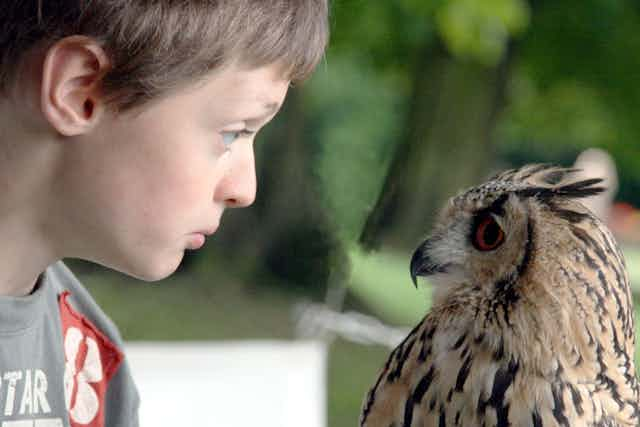We humans tend to consider ourselves apart from other species. But we’re not really so different. So what makes us unique? I’d say it’s language, though not everyone would agree.
Some people insist it’s our large brains, but dolphins have proportionally larger brains than we do. Some still contend our opposable thumbs set us apart, but koalas have two thumbs on each hand.
We walk on two legs? Yes, of course, but the feathered species do that too.
Some are insistent that our individuality as a species rests on the fact we can use tools, but many diverse vertebrate species are tool-users, including primates, elephants and birds. Even the veined octopus and certain ants and wasps have been observed using tools.

The answer, then, is … language. We uniquely have the ability to communicate complex and abstract ideas.
At first it was spoken language. Then, independently, several human cultures developed the written word – the means to communicate with others over thousands of miles or years.
Through language we have built civilisations, developed science and medicine, literature and philosophy. We do not have to learn everything from personal experience, because through language we can learn from the experience of others.
Language makes us human, and it’s encoded in our DNA.
The language gene
FOXP2, known as the “language gene”, has a unique sequence in humans. While other living mammals share identical amino acids at two key amino positions 303 and 325, these amino acids are different in humans (threonine to asparagine at amino acid 303 and asparagine to serine at amino acid 325).
Such substitution mutations occurred some time after we diverged from our common ancestor with the chimpanzee 4-8 million years ago.
We shared this unique FOXP2 protein sequence with both Neanderthals and Denisovans, from which we diverged somewhere in the region of 400,000 years ago.

Compared to these other hominids, humans have an additional mutation in a region that regulates FOXP2 gene expression. Was it this latest mutation in FOXP2 that ensured our survival through better communication, as other hominids went extinct?
This mutation was swiftly incorporated into the human genome at high frequencies during the last 50,000 years suggesting it carries a survival advantage. Studies to understand the effect of this most recent change in FOXP2 are currently underway.
The FOXP2 gene is involved in brain development, particularly those areas involved in vocal behaviour. FOXP2 is particularly important for animals, including songbirds such as finches, canaries and parrots that learn to sing by imitation.
In the songbird brain, FOXP2 expression is highest when birds are learning to sing. Reduction of FOXP2 expression in the brain of zebra finches at this critical period left birds unable to completely or accurately learn to sing.
In humans, FOXP2 mutations are associated with severe speech and language deficits known as developmental verbal dyspraxia – affecting both the ability to coordinate vocal muscles in speech and causing language comprehension difficulties. What a terrible, isolating condition that must be.
In language we find both truth and beauty; then, being human, we use it to argue about what is true and beautiful.
Language is fundamentally what makes us what we are. Would you disagree? If so, please, use your voice and let me know.

